NDIS Plan Manager: A Straight-Talking Guide for Providers in 2025
What Plan Management Actually Is (And Isn’t)
Let’s start with the facts. Under the National Disability Insurance Scheme (NDIS), participants can choose how their funding is managed. One of those options is plan management. It sits somewhere between NDIA-managed and self-managed funding, giving participants flexibility to use both registered and unregistered providers while outsourcing the administrative workload.
A plan manager is a registered provider who handles the financial side of a participant’s plan. This includes paying invoices, tracking budgets, and keeping records. What they don’t do is decide what the participant can buy. That is the NDIA’s job when the plan is set. NDIS experts provide personalised support and insightful advice, helping participants navigate their plans effectively.
Plan managers are essentially the accountants of the NDIS world. They are in charge of compliance, payment integrity, and financial reporting. With the release of impairment notices and tighter claims rules in 2025, the job has become more technical and more exposed to risk.
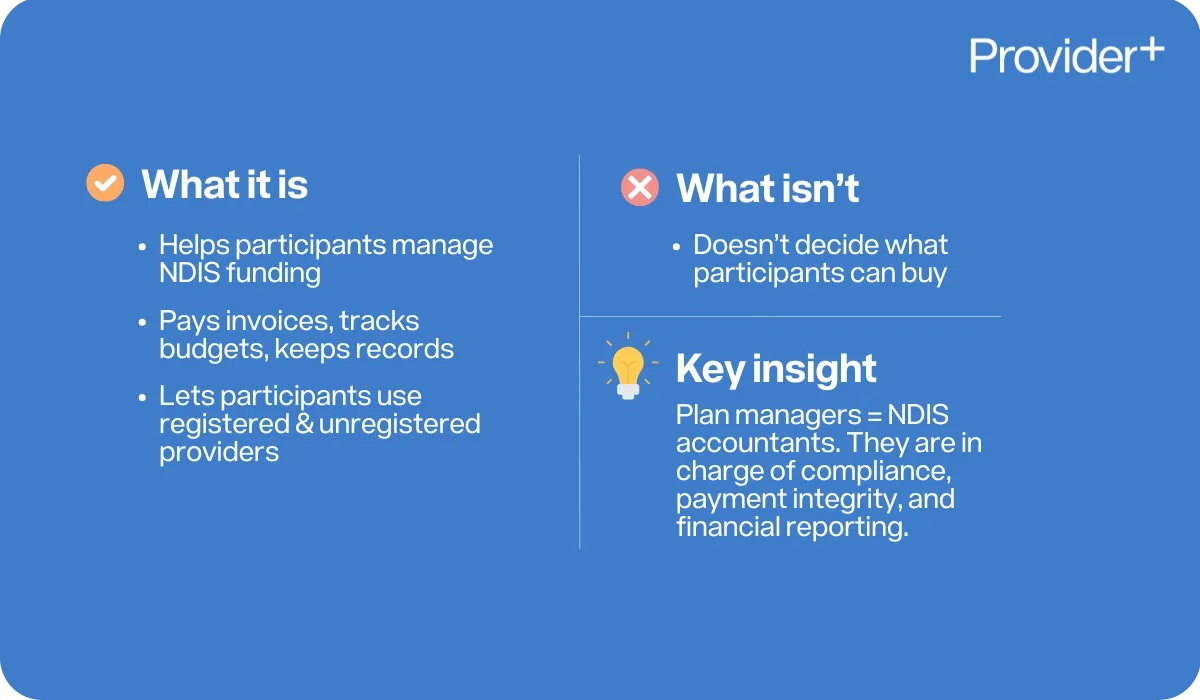
How Plan Management Works (The Essentials)
Participants who choose plan management will have a dedicated budget line item in their plan to cover the cost of the service. That’s important. Plan managers don’t take a cut from other supports.
A key feature of plan management services is the personalised support provided by knowledgeable professionals based in Australia. This support is accessible during extended customer service hours, allowing clients to receive tailored help and expert advice throughout their NDIS journey, thereby enhancing their overall experience and sense of control.
Once a participant has engaged a plan manager and signed a service agreement, the plan manager gets access to their budget categories through the NDIA portal. From there, they handle invoice processing, claim submission, and provider payments, ideally within five business days. This effective plan management aims to achieve the best possible life outcomes for clients.
An important aspect of plan management is the personalised service that enhances client satisfaction. Receiving tailored assistance from knowledgeable teams can significantly improve clients’ understanding of their budgets and overall satisfaction, ultimately contributing to better outcomes when working with their support coordinators and providers
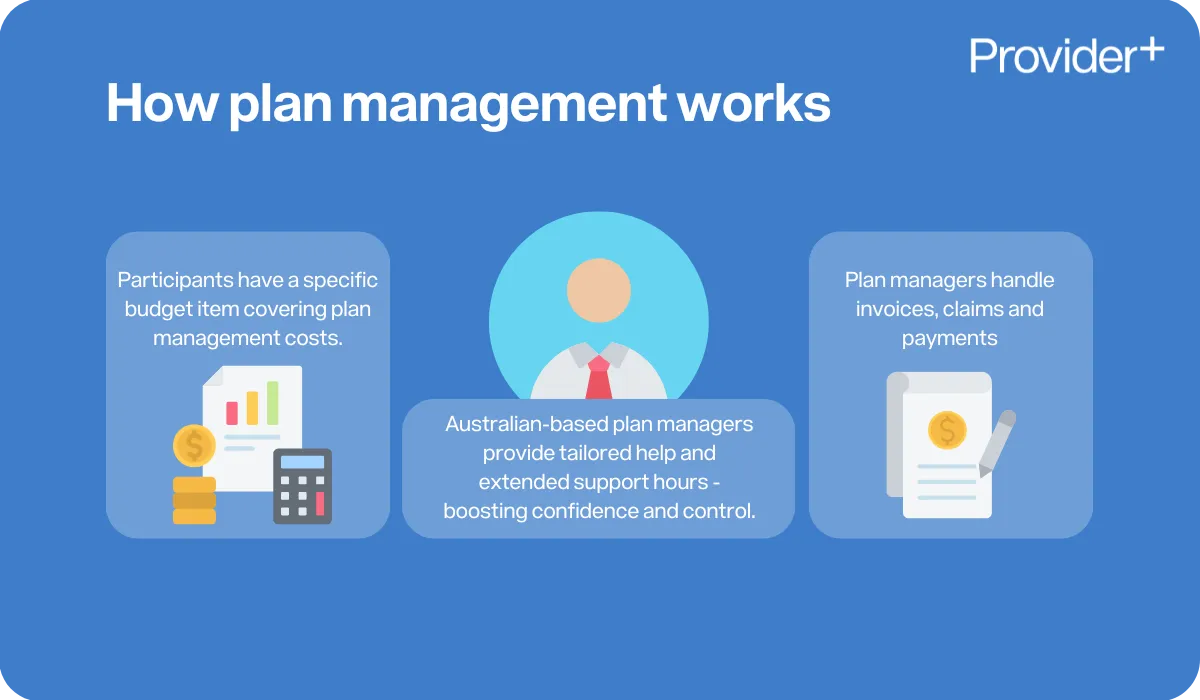
Plan managers must:
- Pay providers (registered or not)
- Monitor participant budgets
- Track claims and detect anomalies
- Provide regular financial statements
- Keep detailed records in case of audit
They must not:
- Decide which supports a participant can access
- Approve services outside the participant’s plan
- Exceed price caps or process vague, unsubstantiated claims
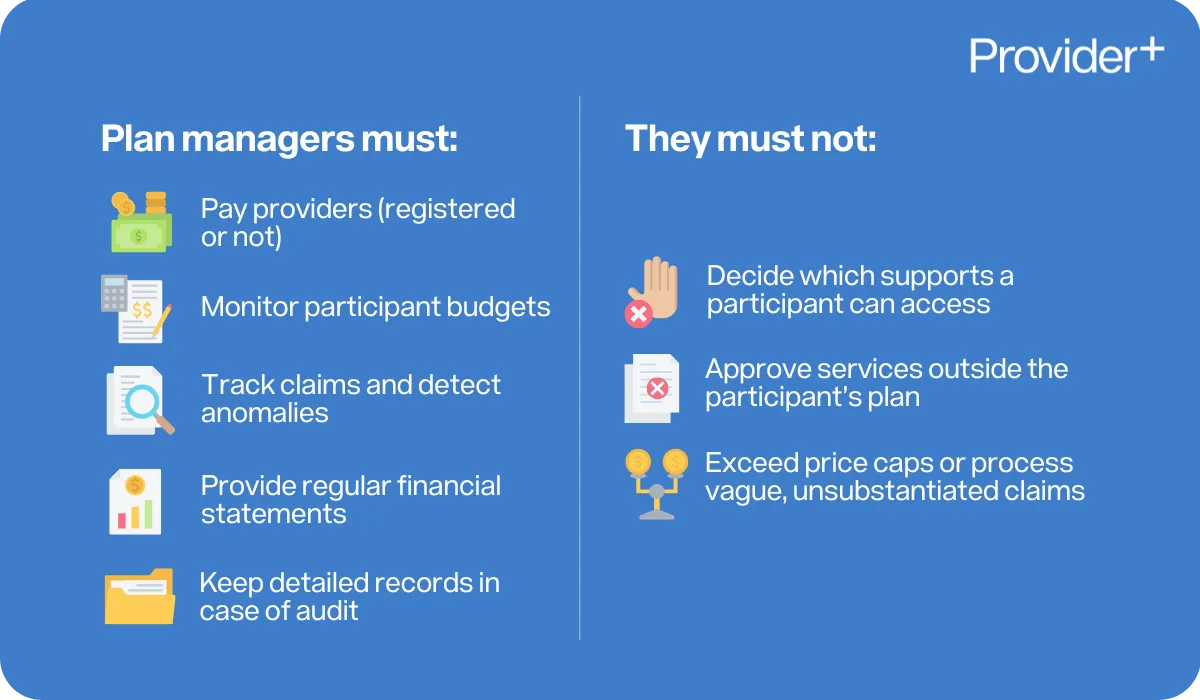
How to Include Plan Management Mid Plan
To change your plan management type within your NDIS plan, you need to contact the NDIA (National Disability Insurance Agency) on 1800 800 110 or your Local Area Coordinator (LAC). You can request a "light touch review" or "desktop review" to discuss switching to plan management. If you have a plan manager, you can also change or remove them by contacting the NDIA or your my NDIS contact.
2024-2025 Annual Pricing Review (APR)
The Annual Pricing Review which is effective from 1 July 2025, includes three key recommendations specifically for Plan Managers, aimed at strengthening financial oversight, improving service value, and supporting participant outcomes under the NDIS.
Recommendation 15:
The NDIA should maintain the current monthly fee for plan management. This applies to support item 14_034_0127_8_3 – Financial Administration of Plan Management, priced at $104.45 per month.
Recommendation 16:
The NDIA should remove the one-off establishment fee for plan management effective from 1 July 2025. This applies to support item 14_033_0127_8_3 – Set Up Costs for Plan Management, which is currently priced at $232.35.
Recommendation 17:
The NDIA should remove remote and very remote loadings for plan management, effective from 1 July 2025, and apply a consistent national price. This applies to support item 14_034_0127_8_3 Plan Management Monthly Fee.
2025 Updates. What’s Changed and Why It Matters
Three major changes came into effect in 2025, all of which directly impact plan management.
Our friendly team is here to help you navigate these updates, providing supportive and approachable assistance to ensure a smooth experience.
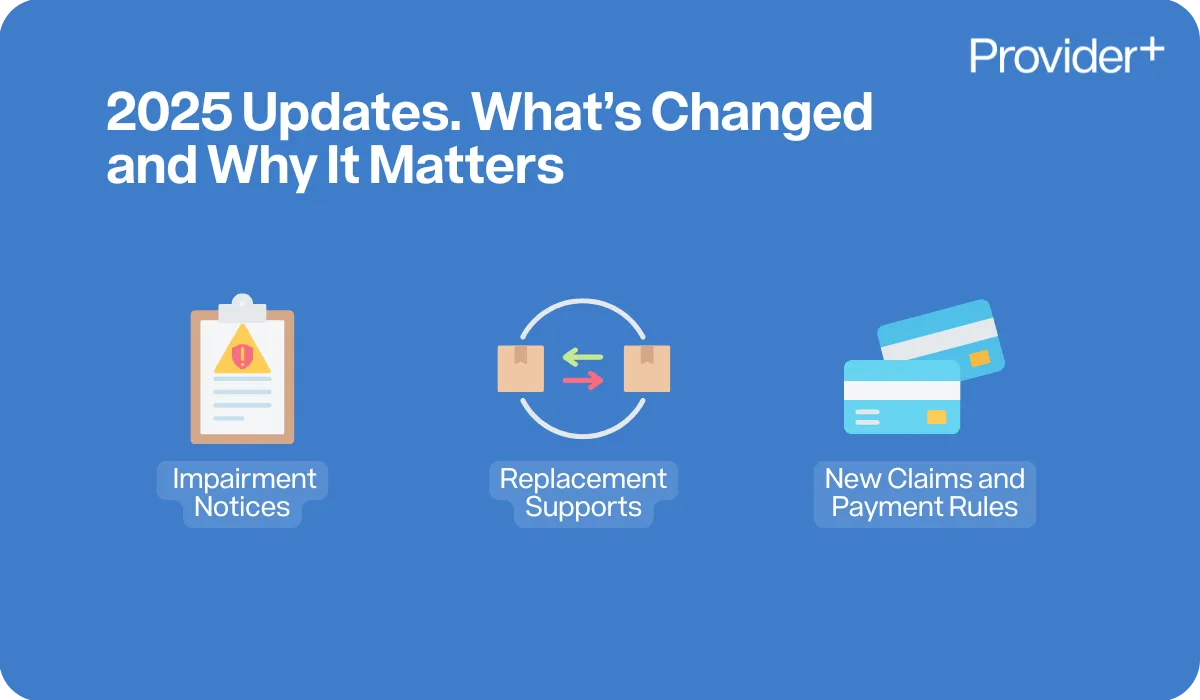
1. Impairment Notices
All NDIS participants now receive an official impairment notice when their plan is approved or reviewed. This document outlines the functional impairments that qualified the person for the scheme (e.g. physical, psychosocial, cognitive).
Why it matters Supports must now be linked to these recognised impairments. Funding can no longer be spent on unrelated needs, even if the participant insists.
Action for plan managers
- Ask for a copy of each participant’s impairment notice
- Cross-check invoices against the listed impairments
- Flag anything that doesn’t align with the participant’s access criteria
- Encourage participants to provide feedback to improve services
2. Replacement Supports
Not everything a participant wants is on the official NDIS supports list. But in some cases, a non-standard item can be approved as a “replacement support.”
Example An e-bike instead of a wheelchair, if it meets the same function at equal or lower cost.
The rules
- Replacement supports require NDIA approval before purchase
- They must substitute an existing funded item
- They must be cost-neutral or cheaper
Action for plan managers
- Do not process any “creative” claims unless an approval letter exists
- Keep a record of NDIA correspondence for every replacement support
- Ensure the NDIS budget is managed effectively when considering replacement supports
3. New Claims and Payment Rules
As of October 2024, all claims must be submitted within two years of the service date. The NDIA also expects:
- Invoice validation within five business days
- Payment to providers or participants within two business days after NDIA approval
Action for plan managers
- Maintain a strict workflow
- Reject any invoice older than 24 months
- Automate reporting to monitor timeliness
- Ensure participants feel supported throughout the claims and payment process
Core Responsibilities. Plan Managers in Practice
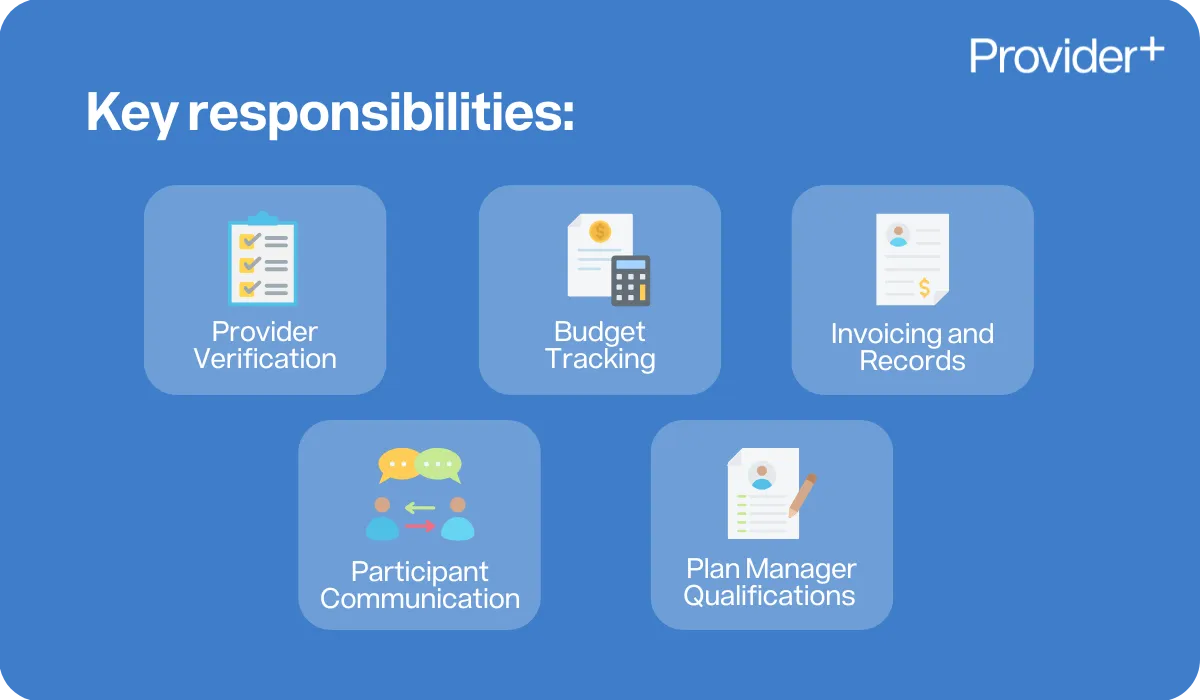
Provider Verification
While participants can use unregistered providers, plan managers must ensure:
- Service providers have a valid ABN (or provide a Statement by Supplier)
- Price limits are not exceeded
- Certain supports (e.g. SDA, behaviour support) come from registered providers
For assistance with provider verification, participants are encouraged to contact their plan manager.
Budget Tracking
Plan managers are expected to:
- Alert participants when budgets are running low
- Prevent overspending
- Help participants get the most out of their plan within its limits
Neglecting this is not just poor service. Providing great service in budget management ensures participants avoid overspending and maximise their plan benefits. It can lead to NDIA recovering funds from the plan manager directly. Additionally, involving family in budget tracking can provide a supportive environment, helping participants navigate their plans more effectively.
Invoicing and Records
Every claim must be backed by a compliant invoice. Minimum requirements:
- Service date(s)
- Description of support
- Item number (if applicable)
- Total amount, ABN, and GST breakdown (if relevant)
Invoices must be stored securely and retrievable for at least five years.
Additionally, it is important to note that plan management benefits from separate funding, which means it does not incur any cost to the individual and does not affect the funding for other services.
Participant Communication
Clear and timely communication is essential.
- Monthly statements to participants
- Notifications if funding is at risk
- Clarification of NDIS rules where needed
- Effective utilisation of a support coordinator to ensure participants receive clear and timely communication
Additionally, the local area coordinator (LAC) plays a crucial role in facilitating effective communication with participants.
Plan Manager Qualifications
All Plan Managers must hold relevant qualifications or professional membership in line with the NDIS Verification Module – Required Documentation criteria.
Acceptable qualifications typically include a degree or diploma in accounting, bookkeeping, or financial management, or current membership with a recognised accounting or bookkeeping professional body (e.g. CPA, IPA, CA ANZ, ICB).
Providers must supply certified evidence of qualifications or membership during the verification audit to demonstrate compliance.
Audit and Compliance. What the NDIA Expects
Plan managers are under increasing scrutiny. The NDIA’s Payment Assurance Program regularly reviews claims and supporting records.
Key triggers for audits include:
- High volumes of replacement supports
- Claims for unlisted or ambiguous items
- Discrepancies between service agreements and invoices
Red Flags to Avoid
- Paying invoices without supporting documentation
- Claiming for services outside the participant’s plan
- Ignoring NDIA price limits
- Holding funds instead of forwarding to providers
Agency-managed plans can help ensure compliance and avoid these red flags by providing separate funding and additional support without extra costs.
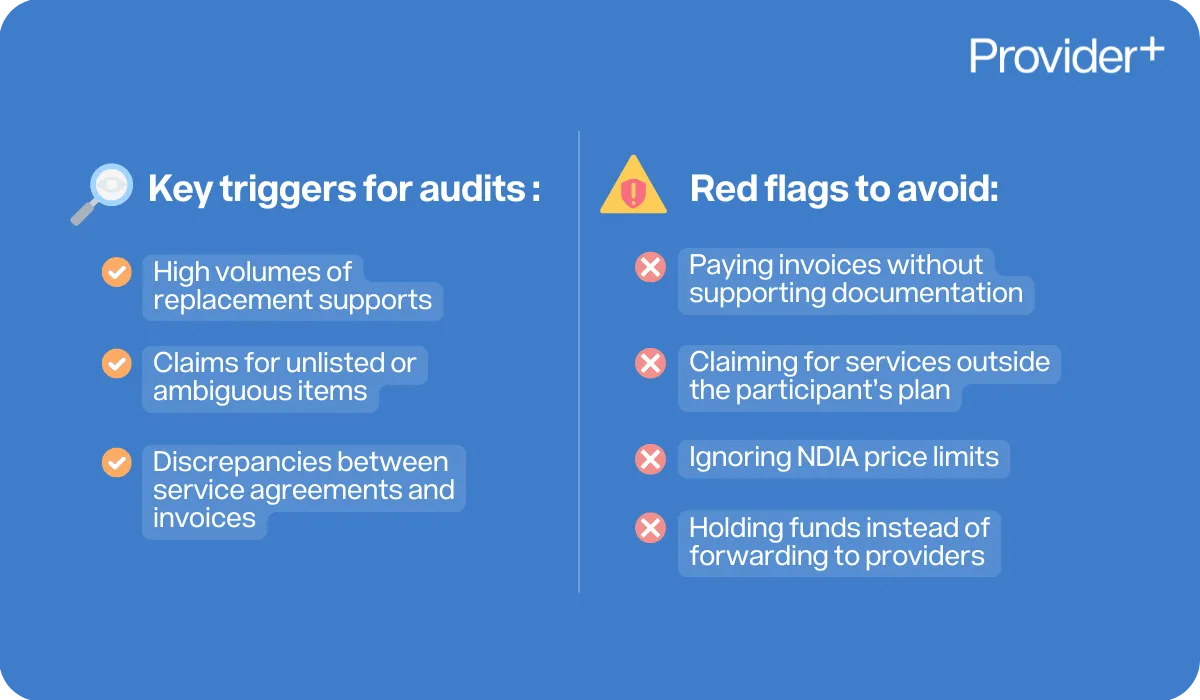
Best Practice Systems and Safeguards
Smart plan managers are investing in:
- Custom CRM platforms with integrated budget tracking
- Automated alerts for low funding thresholds
- Digital record-keeping with cloud backups (preferably within Australia)
- ABN verification tools built into the invoice workflow
They also develop clear policies:
- When to escalate questionable invoices
- How to respond to NDIA payment errors
- Participant education around spending patterns and risks
Frequently Asked Questions (FAQs)
Can I pay a provider if they don’t have an ABN?
Yes, but only if they submit a Statement by Supplier form. Otherwise, it is non-compliant.
What if a participant insists on paying for something not in their plan?
You must decline. NDIS funds can only be spent on approved supports, or replacement supports that have prior NDIA approval.
Do I need to check every item against the impairment notice?Y
ou are not a clinician, but you should be aware if something clearly falls outside the participant’s recognised impairments. If unsure, seek guidance.
Who pays for a disputed invoice?
Until resolved, you do not pay it. Disputes are between participant and provider. Your job is to safeguard plan funds.
Final Word
Plan management is no longer just about prompt payments. In 2025, it is a regulatory role that requires professional judgement, audit readiness, and careful documentation. Done well, it empowers participants to make the most of their plans. Done poorly, it can invite scrutiny, penalties, and serious consequences.
If you are a plan manager, now is the time to tighten systems, review workflows, and ensure your team knows the stakes. Because compliance is no longer a nice-to-have. It is the job.
National Disability Insurance Agency. (2025). Plan management. https://www.ndis.gov.au/participants/creating-your-plan/ways-manage-your-funding/plan-management
National Disability Insurance Agency. (2025). NDIS Guide to Plan Management. https://www.ndis.gov.au/print/pdf/node/81
National Disability Insurance Agency. (2025). Summary of legislation changes. https://www.ndis.gov.au/changes-ndis-legislation/summary-legislation-changes
National Disability Insurance Agency. (2025). Frequently asked questions about legislation. https://www.ndis.gov.au/changes-ndis-legislation/frequently-asked-questions-about-legislation
National Disability Insurance Agency. (2025). NDIS supports lists now available. https://ourguidelines.ndis.gov.au/print/pdf/node/3278
National Disability Insurance Agency. (2025). Applying for a replacement support. https://ourguidelines.ndis.gov.au/media/1756/download?attachment=
National Disability Insurance Agency. (2025). Claims and payments. https://improvements.ndis.gov.au/providers/claims-and-payments
National Disability Insurance Agency. (2025). Plan managers. https://improvements.ndis.gov.au/providers/working-participants/plan-managers
National Disability Insurance Agency. (2025). NDIS Pricing Arrangements and Price Limits 2024-25. https://www.ndis.gov.au/media/7150/download?attachment=
National Disability Insurance Agency. (2025). Introducing changes to NDIS legislation for providers. https://www.ndis.gov.au/events/10611-introducing-changes-ndis-legislation-providers
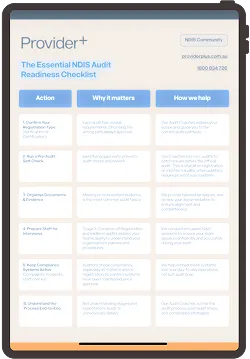

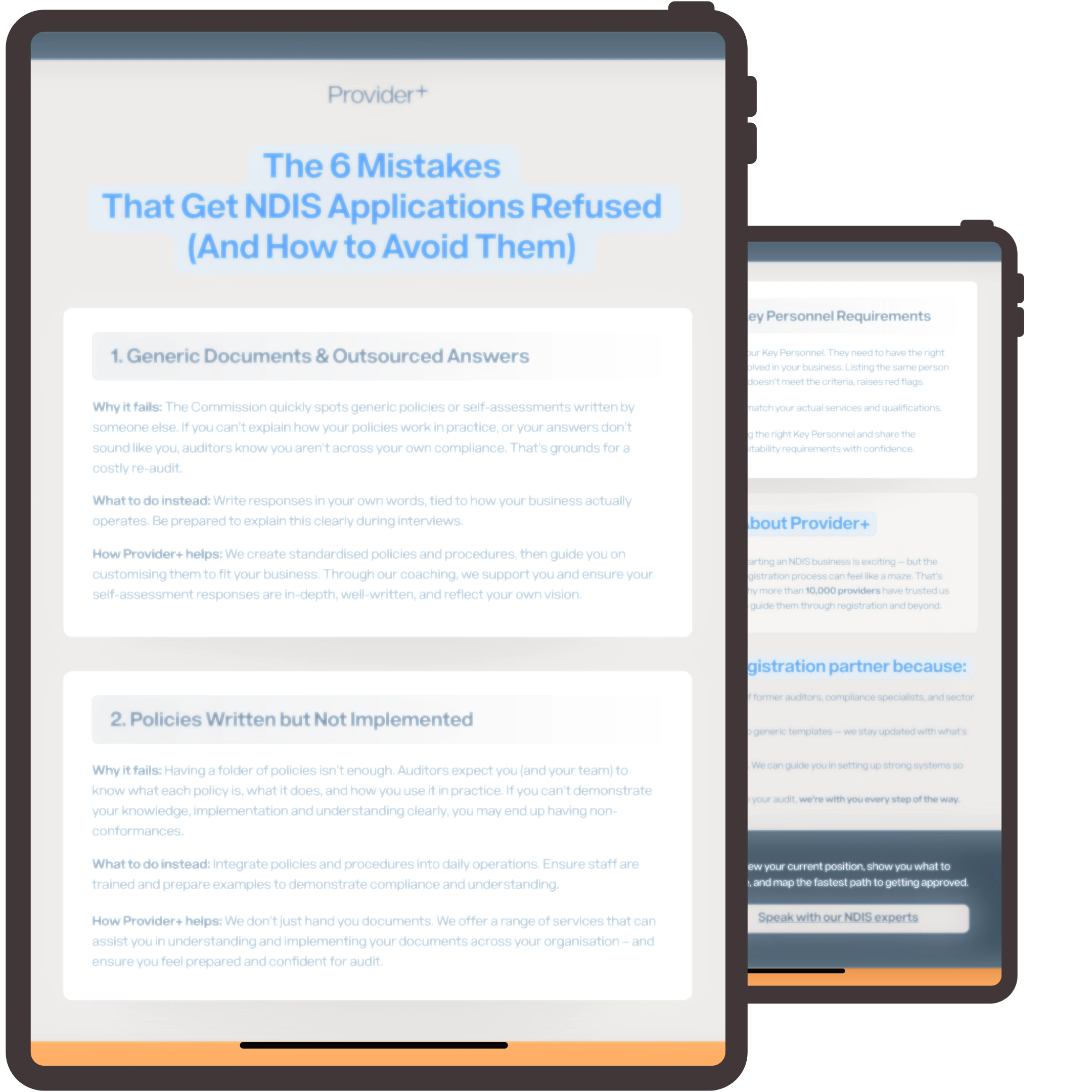

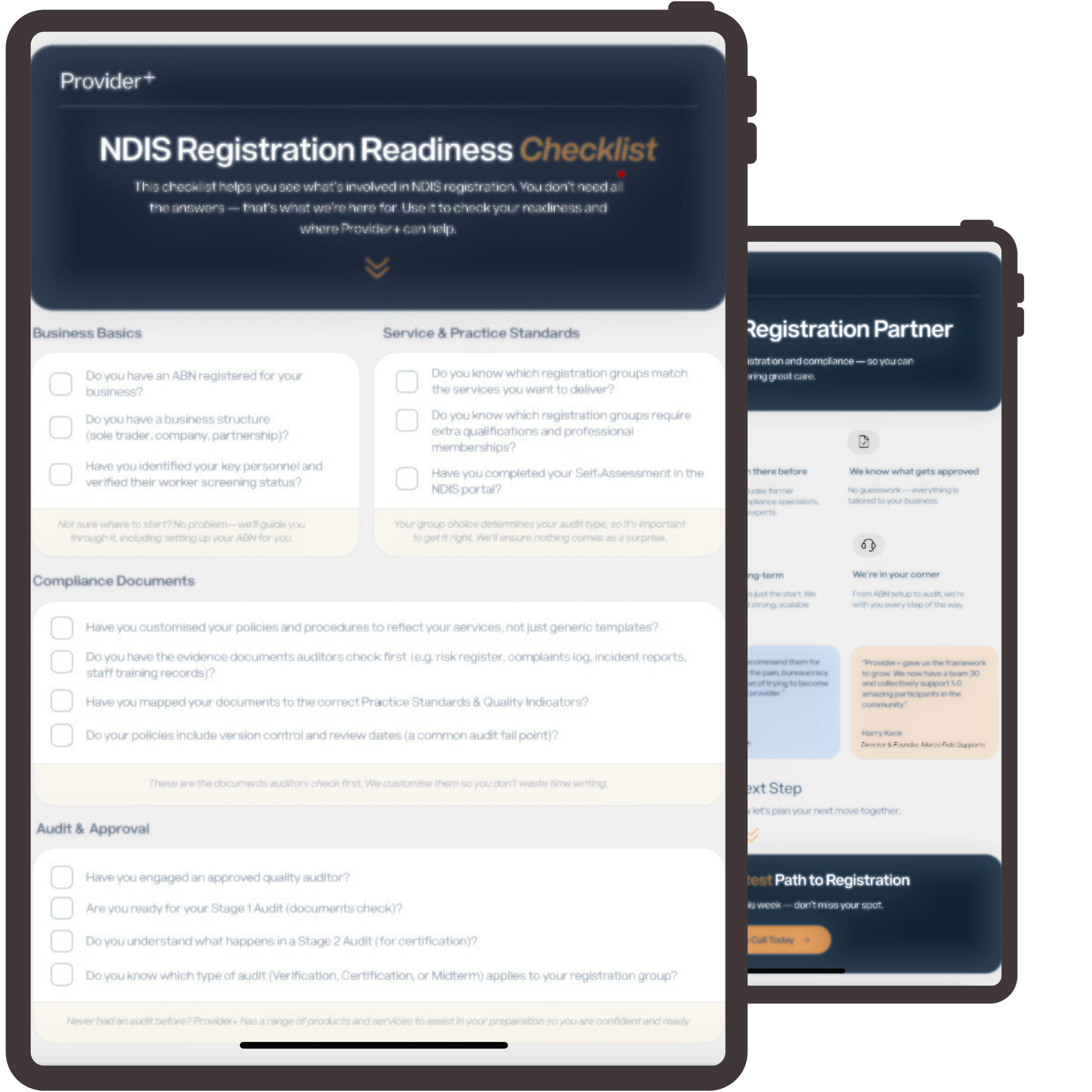


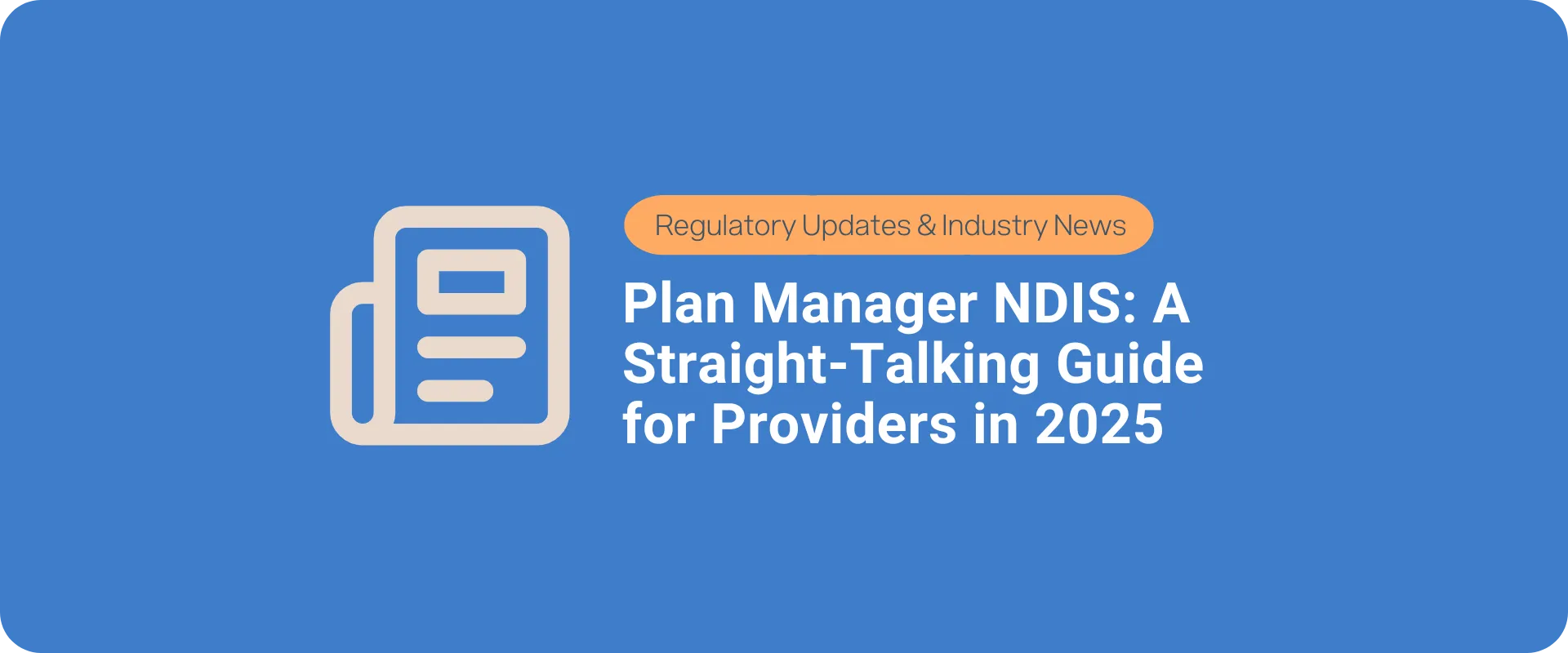
.webp)